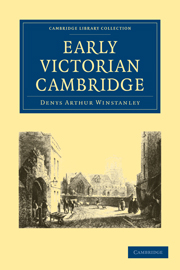Book contents
- Frontmatter
- Contents
- Preface
- Chapter I THE FOUNDATION OF DOWNING COLLEGE
- Chapter II A COLLEGE ELECTION
- Chapter III UNDERGRADUATES IN BONDS
- Chapter IV THE ATTACK ON HEADS OF HOUSES
- Chapter V CHRISTOPHER WORDSWORTH
- Chapter VI THE RELIGIOUS TESTS
- Chapter VII CHANCELLORS AND HIGH STEWARDS
- Chapter VIII TOWN AND GOWN
- Chapter IX TROUBLE AT THE FITZ WILLIAM
- Chapter X INTERNAL REFORM
- Chapter XI THE ROYAL COMMISSION
- Chapter XII BETWEEN THE TWO COMMISSIONS
- Chapter XIII STATUTE XLI AND THE THREE REGIUS PROFESSORSHIPS
- Chapter XIV THE STATUTORY COMMISSION AND THE UNIVERSITY
- Chapter XV THE STATUTORY COMMISSIONERS AND TRINITY COLLEGE
- Chapter XVI CAMBRIDGE AS IT WAS
- Appendices
- Index
Chapter IV - THE ATTACK ON HEADS OF HOUSES
Published online by Cambridge University Press: 07 September 2010
- Frontmatter
- Contents
- Preface
- Chapter I THE FOUNDATION OF DOWNING COLLEGE
- Chapter II A COLLEGE ELECTION
- Chapter III UNDERGRADUATES IN BONDS
- Chapter IV THE ATTACK ON HEADS OF HOUSES
- Chapter V CHRISTOPHER WORDSWORTH
- Chapter VI THE RELIGIOUS TESTS
- Chapter VII CHANCELLORS AND HIGH STEWARDS
- Chapter VIII TOWN AND GOWN
- Chapter IX TROUBLE AT THE FITZ WILLIAM
- Chapter X INTERNAL REFORM
- Chapter XI THE ROYAL COMMISSION
- Chapter XII BETWEEN THE TWO COMMISSIONS
- Chapter XIII STATUTE XLI AND THE THREE REGIUS PROFESSORSHIPS
- Chapter XIV THE STATUTORY COMMISSION AND THE UNIVERSITY
- Chapter XV THE STATUTORY COMMISSIONERS AND TRINITY COLLEGE
- Chapter XVI CAMBRIDGE AS IT WAS
- Appendices
- Index
Summary
The statutes given by Queen Elizabeth to the University, which remained in force until midway through the nineteenth century, constituted the Heads of Houses, as Dean Peacock pointed out, “a distinct and separate estate in the government of the University”. They enjoyed the right of determining any ambiguities in the statutes, and in the sixteenth and seventeenth centuries frequently changed them by interpreting them in a contrary sense to their plain grammatical meaning. With the Doctors of the three faculties of divinity, law and medicine, and the two Scrutators, who were the tellers in the Non-Regent House, they elected that small and autocratic body known as the Caput, of which any member could by his single vote prevent a Grace from being submitted to the Senate. They also acted as the Vice-Chancellor's assessors in the Chancellor's Court, and without their concurrence no student could be expelled and no Doctor or Head of a House imprisoned. The Vice-Chancellor, moreover, had to be annually elected by the undivided Senate on 4 November from two candidates whom the Heads had nominated the day before; and the fortieth chapter of the code prescribed that “the nomination and election of the lecturers, the bedells, stationers, gaugers, wine-sellers, and all other servants or officers of the University, concerning whom provision is not elsewhere made by us, shall follow the method and form prescribed for the election of the Vice-Chancellor”. Under this extremely comprehensive provision the Librarian, the Registrary, and the Public Orator were included; and with a few exceptions the University could choose its officers only from among those whom the Heads had nominated.
- Type
- Chapter
- Information
- Early Victorian Cambridge , pp. 29 - 57Publisher: Cambridge University PressPrint publication year: 2009First published in: 1940



